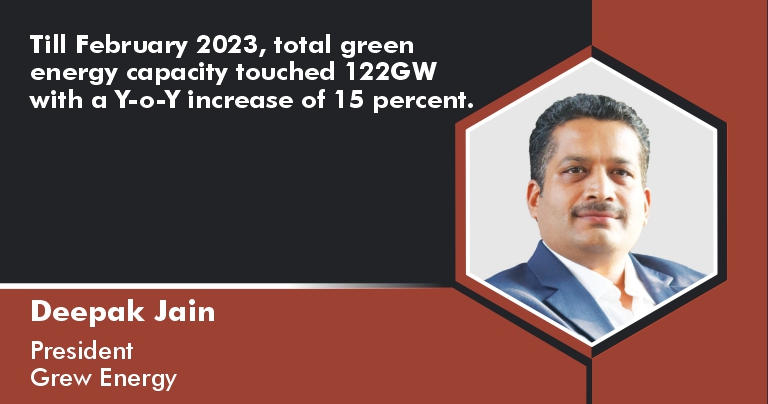India aims to get 50 percent RE share by 2030
By EPR Magazine Editorial December 26, 2023 3:30 pm IST
By EPR Magazine Editorial December 26, 2023 3:30 pm IST

Till February 2023, total green energy capacity touched 122GW with a Y-o-Y increase of 15 percent.
India is at the forefront of a transformative shift towards renewable energy. As of February 2023, its total capacity was 122 GW, marking a 15 percent year-on-year increase. While conventional sources, primarily coal, still dominate electricity generation at over 78 percent, the government aims to elevate renewable contributions to 50 percent by 2030. A comprehensive approach involving policy, technology, and infrastructure is essential to achieve this. This transition presents challenges, including financing hurdles and grid integration issues.
However, strategic government initiatives, such as the PLI Scheme and energy storage mandates, demonstrate a commitment to overcoming obstacles and fostering a sustainable green energy landscape. Deepak Jain has more to say about the booming sector in an interview with EPR Magazine.
What is the current status of renewable energy adoption in India, and how does it compare to conventional electricity generation and capacity?
The Indian renewable market is growing at a tremendous pace. As of February 2023, India’s total renewable energy capacity had reached 122GW, a 15 percent year-over-year increase.
Regarding conventional energy sources, coal has been a leading source of electricity generation in India for decades. However, the growing inclination for clean energy is boosting the development of various renewable energy sources.
Compared to nonconventional energy sources, conventional sources still contribute over 78 percent of total electricity. Renewable energy contributed 12.3 percent of total electricity, and through various strategies, the Central Government aims to bring this to 50 percent by 2030.
How can India establish an integrated green energy grid for efficient electricity transfer across regions, ensuring equitable pricing and maximising green resource utilisation?
Establishing an efficient and integrated green energy grid nationally is quite a strenuous, time-consuming process requiring detailed planning and considerable resources. With a comprehensive approach coupled with policy, technological and regulatory measures, authorities can strategise an effective plan for developing an integrated green energy grid for efficient electricity transfer across regions.
A reliable and reasonable energy grid would need major investment in infrastructure and advanced technology, supportive policies for energy storage systems, an inclusive policy and regulatory framework, and cooperation from various state governments.
What government policies and incentives exist to promote developing and deploying green energy technologies in India?The central government and the Ministry of New and Renewable Energy (MNRE) have been actively promoting renewable energy through various schemes and initiatives to boost adoption, consumption, and manufacturing. As of July 2023, India’s installed renewable energy capacity was over 173 GW, 41 percent of the entire power capacity.
The PLI Scheme has helped emerging solar manufacturers like Grew develop technologically advanced manufacturing facilities in India. Moreover, the government plans to register solar panels made only of domestically manufactured cells, wafers, and polysilicon under the Approved List of Models and Manufacturers in the coming years, which will tremendously boost the manufacturing of solar components in India.
How is India addressing the challenges of integrating intermittent renewable energy sources like solar and wind into the national grid to ensure a stable and reliable energy supply?
India is currently ranked fourth in the world regarding installed renewable energy capacity. The Centre is taking strategic and calculated steps to ensure the effective implementation of various existing policies that promote and encourage the installation and adoption of renewable energy systems. In addition to policy support, the government is also developing the infrastructure required for grid upgrades and better inter-state coordination, which will efficiently respond to the increasing demand for green and clean energy.
The Ministry of Power has released a national framework to promote energy storage systems. It recommends a mandatory requirement to install ESS with at least 1-hour storage for a minimum of 5 percent of the capacity of renewable projects (excluding hydro installations) with sizes over 5 MW. This recommendation aims to secure a consistent power supply, stability of grids, and better connectivity to inter-state energy transmission systems. The proposal gains significance as it would bring almost all utility-scale green energy projects under its ambit, given that the capacity bid out is much higher than 5MW.
What are the major obstacles hindering the widespread adoption of green energy solutions in India?
One of the biggest challenges is financing solar or other renewable energy installations with high initial costs. Other major challenges in the widespread adoption of renewable energy solutions include grid integration, inter-state policies and their coordination with national targets, infrastructure, and the intermittency of power generation from renewable sources.
The government is working on schemes to tackle these challenges, such as developing energy storage systems, grid upgradation, and upgrading state policies for solar, wind, and other renewable energy sources.
Spokesperson: Deepak Jain, President- Grew Energy
We use cookies to personalize your experience. By continuing to visit this website you agree to our Terms & Conditions, Privacy Policy and Cookie Policy.